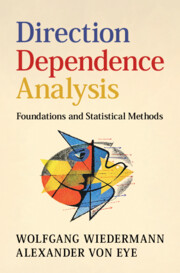Book contents
- Direction Dependence Analysis
- Direction Dependence Analysis
- Copyright page
- Contents
- Preface
- Chapter 1 Introduction
- Chapter 2 The Linear Regression Model
- Chapter 3 Asymmetry Properties of Distributions of Observed Variables
- Chapter 4 Asymmetry Properties of Error Distributions
- Chapter 5 Independence Properties of Causes and Errors
- Chapter 6 Direction of Dependence under Latent Confounding
- Chapter 7 The Integrated Framework of Direction Dependence Analysis
- Chapter 8 Stability and Sensitivity Analyses
- Chapter 9 Extensions and Applications
- Chapter 10 Statistical Software
- Chapter 11 Concluding Remarks
- References
- Index
Chapter 6 - Direction of Dependence under Latent Confounding
Published online by Cambridge University Press: 16 September 2025
- Direction Dependence Analysis
- Direction Dependence Analysis
- Copyright page
- Contents
- Preface
- Chapter 1 Introduction
- Chapter 2 The Linear Regression Model
- Chapter 3 Asymmetry Properties of Distributions of Observed Variables
- Chapter 4 Asymmetry Properties of Error Distributions
- Chapter 5 Independence Properties of Causes and Errors
- Chapter 6 Direction of Dependence under Latent Confounding
- Chapter 7 The Integrated Framework of Direction Dependence Analysis
- Chapter 8 Stability and Sensitivity Analyses
- Chapter 9 Extensions and Applications
- Chapter 10 Statistical Software
- Chapter 11 Concluding Remarks
- References
- Index
Summary
Chapter 6 discusses Direction Dependence Analysis (DDA) in the presence of latent confounders, that is, variables that are not available to the researcher but affect both predictor and outcome. Distributional measures of direction of dependence can be affected by latent confounders when external influences are non-Gaussian. Third moment-based DDA measures preserve their direction of dependence properties under hidden confounding provided that the distribution of the confounder is symmetric. Analogously, fourth moment measures of direction of dependence remain valid under hidden confounding when the confounder distribution is mesokurtic. In addition to their potentially adverse effects on distributional DDA measures, hidden common influences also affect independence-based approaches to direction of dependence. The presence of unconsidered confounders causes predictors and errors to be stochastically dependent. This has consequences for causal model selection. Implications of latent confounders for estimating the magnitude of the causal effect and determining its direction of dependence are described. Adjustments of DDA decision rules are presented and results of a Monte-Carlo simulation experiment are used to illustrate the performance of DDA measures under latent confounding. A real-world data example is presented to demonstrate the application of DDA and consequences for model selection when (known) common influences are omitted from the analysis.
Information
- Type
- Chapter
- Information
- Direction Dependence AnalysisFoundations and Statistical Methods, pp. 172 - 205Publisher: Cambridge University PressPrint publication year: 2025
